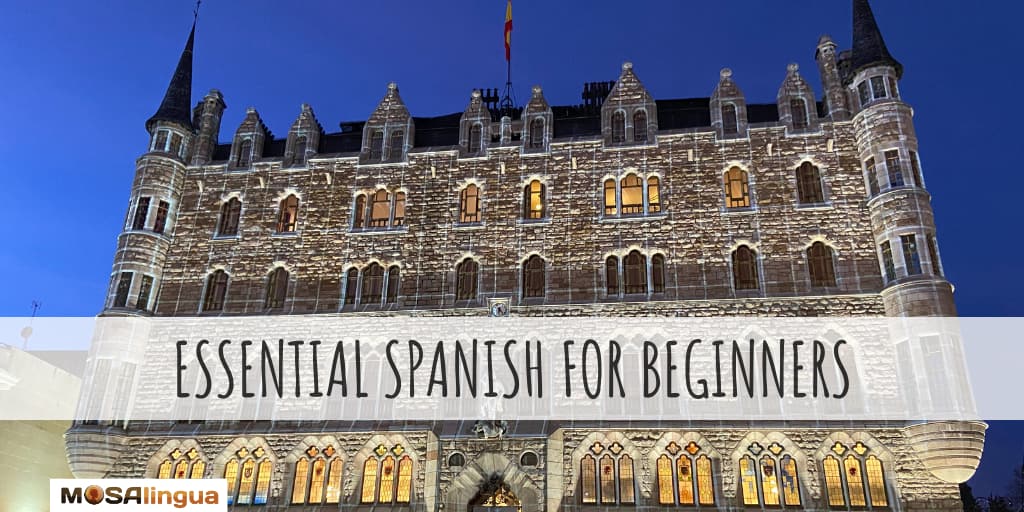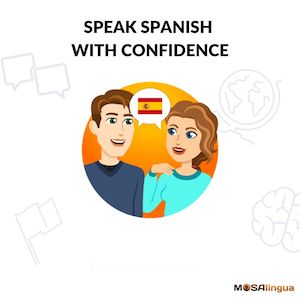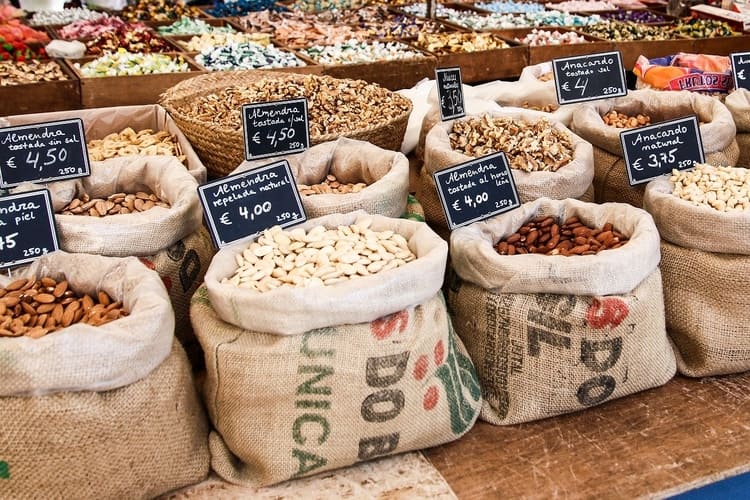We’re going to equip you with the most essential Spanish phrases for beginners and a nifty list of 50 basic Spanish words that will help get your foot in the door to learning this wonderful language. Here is our ultimate list of Spanish phrases that you can use right now, even if you’re just starting out.

The Ultimate List of Essential Spanish Phrases for Beginners
Are you traveling in the near future and are just now realizing you could do well with a few common phrases? Well, if you are headed to a Spanish speaking country, then we’ve got you covered.
The Best Place to Start Is with Greetings
There are many useful Spanish phrases for conversation and common Spanish sayings, but the most important Spanish phrases for beginners come in the form of greetings.
When you meet a kind stranger on your trip, try to strike up a conversation with the following:
- ¡Hola! – Hello
- Mucho gusto (pronounced moo-cho goos-toe) – Nice to meet you.
- Me llamo … (pronounced may yah-mo) – My name is …
- ¿Cómo te va? – How is it going?
- Estoy bien – I’m fine.
- ¡Gracias! – (a simple Spanish phrase that you may already know) – Thank you!
- ¿Qué tal? – How are you?
- Por favor – Please
You may have come across these conversational Spanish phrases before, or in the list we provided above. But let’s put it into context.
A: ¡Hola! ¿Cómo estás?
B: Estoy bien, gracias. ¿Y tú? (and you?)
A: Bien. Me llamo Lisa.
B: ¡Hola, Lisa! Mucho gusto.
And there you have it! How much of that did you understand? We wouldn’t be surprised if your answer is 80-100%! You can have a basic conversation already, that’s why these are good Spanish phrases to know.
Directions and How to Deal with Problems
When you are wandering around Ibiza or trying to find your way to La Sagrada Familia, you are bound to need some help along the way.
Aside from not panicking when you need help but don’t speak the language, you can also remember these Spanish expressions.
- ¿Puede ayudarme? (pronounced pwe-de a-yu-dar-may) – Can you help me?
- ¡Sin problema! – No problem!
- ¿Puedes hablar más despacio? (pronounced pweu-des ha-blar mas des-pa-sio) – Can you speak more slowly?
- No entiendo (pronounced no en-tee-en-doe) – I don’t understand.
- ¿Puede repetirlo? (pronounced pwe-de re-pe-teer-lo) – Can you repeat that?
- ¿Dónde está …? (pronounced don-day es-ta) – Where is …?
- Perdóname – Pardon me/excuse me
- Estoy perdido – I’m lost
Now let’s see what these basic Spanish phrases look like in conversation, shall we?
A: Perdone, estoy perdido. ¿Puede ayudarme?
B: ¡Sin problema!
A: Gracias. ¿Dónde está el baño? (pronounced ba-nio, meaning “bathroom”)
B: Está a la izquierda. (pronounced eez-kee-air-da, meaning “left”)
A: ¿Puede hablar más despacio?
B: Si, es-tá a la iz-quier-da.
A: Ah, entiendo. ¡Gracias! (pronounced en-tee-en-doe, meaning “I understand”)
B: De nada. (you’re welcome)
It’s just that simple! It’s hard to believe that in the span of maybe 10 minutes (if you quickly scanned over our top 50 list), you can already understand not one but two short conversations. Now let’s see what other useful Spanish phrases we have in store.
Common Spanish Phrases for Beginners to Use at a Restaurant
Something I’m sure a lot of us enjoy doing on a trip is tasting the authentic and exotic cuisines of the land. If you happen to find yourself in a small town that no English speakers seem to inhabit, then these next Spanish phrases could be your lifesaver.
- ¿Qué desea comer? / ¿Quiere algo para comer? – What would you like to eat? If you find yourself stuck, but you hear the word comer (pronounced co-mare), meaning “to eat,” there is a good chance the sentence is about eating or food.
- ¿Qué desea beber? / ¿Quiere algo para beber? – What would you like to drink? As you may have guessed, beber (pronounced beh-ber), means “to drink.”
- ¿Qué quiere? – What do you want?
- ¿Qué quiere comer? – What do you want to eat?
- ¿Lo siento / Lo lamento, no tenemos … – Sorry, we don’t have …
- Un momento – One moment.
- ¿Qué me recomienda? (pronounced re-co-mee-en-da) – What do you recommend?
- Soy vegetariano (male) / Soy vegetariana (female) – I am a vegetarian.
- Tengo alergia a … / Soy alérgico(a) a … (pronounced ah-ler-hia) – I am allergic to …
- Yo quiero … – I want …
- Quisiera … – I would like …
- ¿Cuánto cuesta? – How much is it?
- La cuenta, por favor – The bill, please.
It looks like a lot to take in, but you will be surprised at how much you understand and how many basic Spanish phrases you recognize by the end of this article. Before we apply the above phrases in conversation, we’re going to introduce some easy Spanish words for food.
You need to eat!
- Un entrante – A starter/appetizer
- Una sopa – A soup
- Una ensalada – A salad
- Un plato principal – Main dish
- Carne – Beef
- Pollo – Chicken
- Un postre (pronounced pos-tray) – A dessert
- Una bebida – A drink
- Agua – Some water
- Un café – A coffee
- Vino – Wine
- Cerveza – Beer
Let’s take a look at what all this looks like in a conversation.
A: Hola, ¿Quiere algo para comer o beber?
B: ¡Hola! Quiero agua, por favor.
A: Vale. ¿Y para comer?
B: Soy vegetariana. ¿Qué me recomienda?
A: La ensalada está muy buena.
B: Bueno, quiero la ensalada y una sopa, por favor.
A: Vale, gracias.
After you have finished your meal
B: Perdone, la cuenta, por favor.
A: Aquí está.
B: ¿Cuánto cuesta?
A: Son veinte euros.
How much did you understand this time around? Don’t get frustrated if you didn’t understand it all, there were some new Spanish vocabulary words in there. However, we bet you could get at least 70%!
Introducing Yourself in More Detail
When you meet a friendly local and they have taken an interest in you, you may need to introduce yourself in more detail. This brings us to our essential Spanish phrase of the day: “Soy de,” which means “I am from …”
- Mi nombre es … – My name is … Or you can feel free to use the phrase we learned above, me llamo.
- Soy de … – I am from …
- Vivo en … – I live in …
- Tengo … años – I am … years old.
- Soy … – I am a … (used for your occupation)
- Me gusta … – I like …
You may not want to give too much information, and with the above basic and common Spanish phrases, you will seem warm and friendly without divulging too much.
A: ¡Hola! Mucho gusto.
B: ¡Hola! Me llamo Lisa. Soy de Estados Unidos pero vivo en Madrid. Tengo veinte años y soy estudiante (student). Me gusta cantar (to sing). ¡Mucho gusto!
There you have it! You just learned a simple introduction in under 5 minutes! If you think just a few phrases aren’t enough, there are plenty of other Spanish expressions ranging from elementary to advanced just waiting for you to learn!
Spanish for Beginners Conclusion
You can roll the dice and bet on getting by with just English in a new country. However, we suggest familiarizing yourself with these essential Spanish phrases for beginners if you are headed to Spain. Not only will they come in handy if your companion or new friend doesn’t speak a lot of English, but it will also make solo traveling easier if you happen to be alone.
It’s amazing how much you can learn in under 20 minutes!
Memorize these phrases before your trip
If you haven’t already, download the MosaLingua Learn Spanish app. It includes all of these helpful phrases for beginners, plus tons more vocabulary (basic to advanced) to help you communicate all of your needs and desires in Spanish. With the Spaced Repetition System, all you need is 5 minutes a day, and you’ll be ready for your trip in no time.
About the author: This article is delivered to you by Preply, an online learning platform that connects language tutors and students worldwide. Preply unites more than 100,000 students who are learning 50+ foreign languages.
Related posts:
Improve your spoken Spanish

Good news: we have a course for that! The Speak Spanish with Confidence MasterClass.
It’s a comprehensive 8-module course designed to help you improve every aspect of your spoken Spanish – fluency, confidence, pronunciation, and more – step by step, and enjoy doing it.





Comments